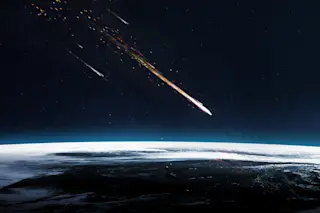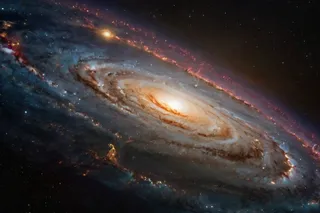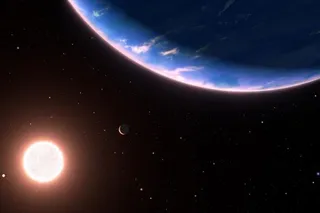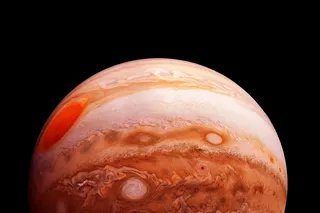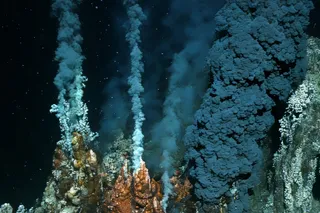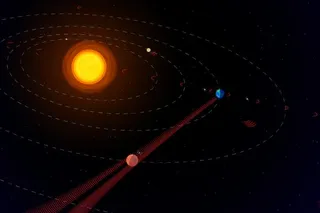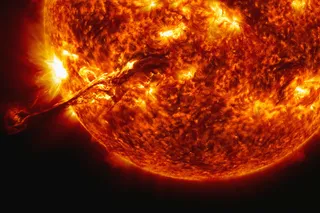When it comes to life and its history on Earth, meteorite impacts have been one of the ever-present threats to total extinction. It's even possible that life may have had multiple beginnings — with early iterations being utterly destroyed by the impact of a massive body early in Earth's history.
We know, though, that life has managed to expand and diversify into almost every available ecological niche on the planet and that all life on Earth can be traced back to a last universal common ancestor that existed some 3.6 billion years to 4.2 billion years ago. Since then, impacts on Earth's surface have regularly disrupted the living order, yet life remains.
Meteorite impacts, when viewed through their ability to radically alter Earth's environment, have been considered a force for destruction. However, with a more nuanced perspective on the history of life on Earth, along with a greater understanding of the role that meteorite impacts have had in shaping the world we live in, scientists are reconsidering these events as detrimental to a planet's ability to support life.
How Meteorites Shaped Earth's Evolution
Alexandra Pontefract, a microbiologist who specializes in how impacts influence planetary habitability from Johns Hopkins' Applied Physics Laboratory, thinks that the sentiment that impacts are detrimental to life can be traced back to our understanding that the mass extinction of the dinosaurs was due to a large impact at the end of the Cretaceous.
"At this time, the existence of a global layer of iridium, marking the end of geologic preservation of dinosaurs, was discovered, resulting in a groundbreaking hypothesis that a large meteorite impact caused a global extinction level event," Pontefract says.
"The idea that we could be wiped out by this type of global catastrophe is also something that captures our imaginations, and this filtered into popular culture in the 1990s, with Deep Impact and Armageddon, fomenting the idea that a giant fiery ball heading towards us is generally not a good thing," she continues.
Read More: Did Life on Earth Come From Outer Space?
Asteroid Dust and Its Role in Supporting Life
However, through Pontefract's work and others, researchers are realizing that meteorite impacts on planetary (and moon) surfaces can also positively shape habitable conditions.
Take, for example, the work done by Kurosawa, who showed that carbon-rich asteroids can react with atmospheric nitrogen to produce hydrogen cyanide — which is thought to be one of the most important chemical precursors to the origin of life. Smaller asteroids, as well as the constant infall of interplanetary dust, are also a source of biologically relevant organics to planetary surfaces, such as sugars, amino acids, and carbohydrates.
"It is important to note that this infall would have been higher early on in the evolution of the solar system due to the higher concentrations of asteroids and comets," says Pontefract.
Larger impacts can also be responsible for generating a number of habitable environments in which life can thrive. The crust of rocky worlds like our own, and even icy worlds like Jupiter's moon Europa, can be significantly fractured by the passage of a shockwave from an impact.
"On Earth, this has been shown to have increased the habitability of the subsurface by microbial life. On ocean worlds, this fracturing could lead to important connectivity between the icy surface and the subsurface ocean, promoting chemical reactions that could support life," Pontefract explains.
An additional consideration is the energy that impacts can transfer to planetary bodies via heat. While an impacted area can reach temperatures high enough to vaporize rock, such impacts can also promote the generation of hydrothermal systems, such as those that exist deep in Earth's ocean.
Pontefract points out that ocean worlds, or worlds that lie outside of the "habitable zone" of their star may be reliant on impact events as a mechanism to provide heat that supports habitable environments, where low temperatures may be a barrier to the emergence of life.
"Depending on the size of the impactor and the temperature of the planetary body, these systems can persist on the order of thousands to millions of years," Pontefract says.
Read More: Asteroid Impacts Shaped Earth's Earliest Life
Can Meteorites Reset Planetary Habitability?
When considering the influence impacts might have on a planet's habitability, Pontefract also explains that a body's status as harboring a biosphere, or lack thereof, is also important for the following reasons.
In some sense, meteorite impacts can be thought of as resetting events (the area that is reset is dependent on the size of the impact). If an established biosphere exists on a planet, and a large meteorite impact occurs, the event is obviously detrimental to the existing biology. In time, however, the zone of habitability post-impact can increase, where new habitat is created within rocks and the subsurface for existing biota to colonize.
"These types of events strongly affect the course of evolution, as they did here on earth, where the extinction of the dinosaurs cleared the way for mammals," says Pontefract.
In abiotic — environments absent of life — impacts can be pivotal actors in facilitating the origin of life events. As mentioned earlier, impacts are a source of heat, energy, and nutrients. Pontefract also explains that impact craters, closed-basin environments, can contain high concentrations of chemistry due to evaporation, and origin of life scholars have shown that dehydration is an important process for forming nucleic acids from basic building blocks.
"The ocean worlds are tantalizing targets for life detection, having global saline oceans. The issue with supporting life on these worlds beyond the temperature constraints, is the potential lack of oxidation-reduction chemistry, which is the basis of all life. The reducing ocean is separated from the oxidized surface by kilometers of ice. Thus, the formation of habitable environments on these worlds is dependent on events that can promote mixing of these two regions. Impact cratering is one such mechanism," Pontefract says.
How an impact might influence habitability on a given planet or moon is contextual to that body — whether it is rocky, watery, inhabited, or uninhabited, for example. However, the numerous ways that impacts can alter the conditions on a planet suggest our simplistic sentiment that impacts are bad for life needs further thought.
The work being done by Pontefract and other researchers in the area is helping us to better understand how events in Earth's deep history have influenced it to become the life-bearing world it is today. They are also helping us understand the factors that go into determining a body's ability to support life — important knowledge if we ever want to find life on worlds other than our own.
Read More: Thousands Of Meteorites Hit Earth Each Year
Article Sources
Our writers at Discovermagazine.com use peer-reviewed studies and high-quality sources for our articles, and our editors review for scientific accuracy and editorial standards. Review the sources used below for this article:
PNAS. Multiple origins of life
Nature Ecology & Evolution. The nature of the last universal common ancestor and its impact on the early Earth system
Microbiologist who specializes in how impacts influence planetary habitability from Johns Hopkins' Applied Physics Laboratory. Alexandra Pontefract
Origins of life and evolution of the biosphere. Hydrogen cyanide production due to mid-size impacts in a redox-neutral N2-rich atmosphere
The University of Edinburgh. Uninhabited habitats on Mars
The Planetary Science Journal. Impacts on Ocean Worlds Are Sufficiently Frequent and Energetic to Be of Astrobiological Importance



